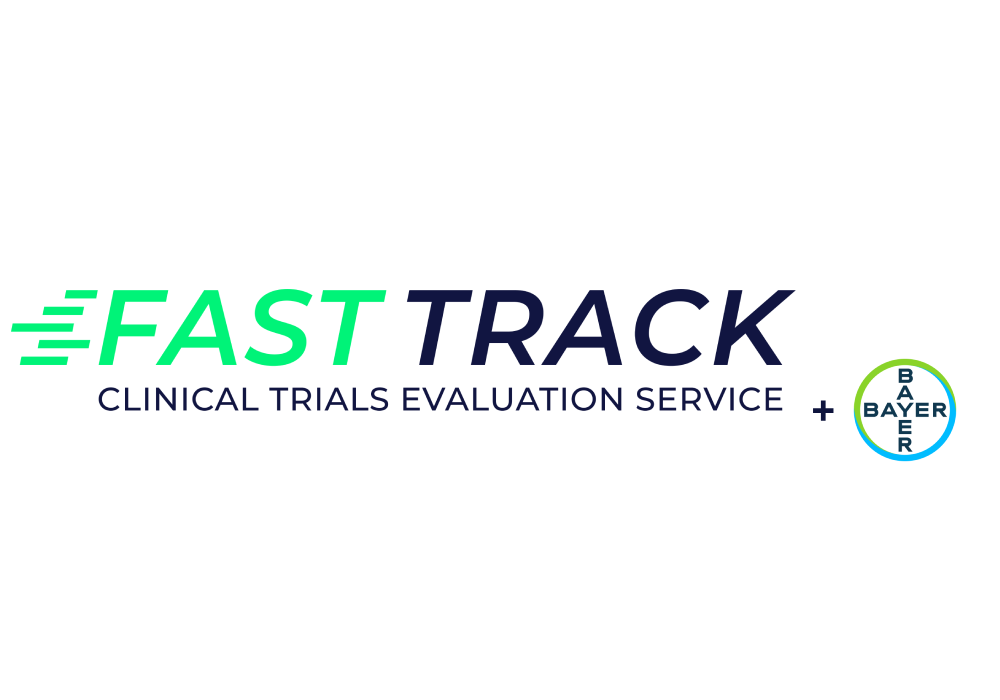Bayer Liver Cancer Study: 3 Quebec Institutions Rank Among the Top 3 Worldwide
With support from the FAST TRACK Evaluation Service, three Quebec hospital research centers were positioned at the very top globally for the speed of implementation of a Phase I clinical study conducted by Bayer on hepatocellular carcinoma.
The Centre hospitalier de l’Université de Montréal (CHUM), with Dr. Daniel Juneau, was the first site activated worldwide from among 24 sites in 22 countries.
The Centre hospitalier universitaire de Sherbrooke (CHUS), with Dr. Frédéric Lemay, ranked second of all sites activated in the world.
The McGill University Health Centre (MUHC), with Dr. Victoria Mandilaras, was the third site activated, and it recruited the first patient worldwide.
These results reflect the exceptional commitment of the teams and partners involved.
To date, Bayer has used the FAST TRACK Evaluation Service for 17 institutional evaluations, with a median authorization time of 12.6 weeks and a median activation time of 13 weeks. In these studies, Quebec institutions partnering with the service have consistently ranked first in Canada and in the top three worldwide four times.
“Bayer Canada is pleased to announce the FAST TRACKED activation of three BANTAM-01 sites in Quebec, made possible by CATALIS Quebec’s FAST TRACK Evaluation Service and our exceptional Canadian study team. This partnership has significantly accelerated activation, allowing Quebec patients to become the first in the world to access this innovative treatment for hepatocellular carcinoma. This type of success further reinforces Canada’s attractiveness for global clinical trials and aligns well with Bayer’s commitment to advancing healthcare and improving patient outcomes globally.”
– Alison Batty, Head Site Management in Canada, Bayer
Three Quebec Hospital Research Centres at the Forefront of Clinical Studies on Cancer
Recognized as a leader in nuclear medicine in Quebec, the CHUM stands out for its infrastructure’s excellence and its teams’ expertise. Dr. Daniel Juneau, a nuclear medicine specialist, leads a team specializing in imaging and targeted therapies, mainly focused on oncology.
As for gastroenterologist-oncologist Dr. Frédéric Lemay, he is conducting his research activities at the Université de Sherbrooke’s Cancer Research Institute, which is an interdisciplinary centre of excellence.
At the MUHC, Dr. Victoria Mandilaras, who specializes in gastrointestinal and gynecological cancers, leads the study at The Centre for Innovative Medicine at the MUHC Research Centre, a centre entirely devoted to clinical research.
“In recent years, the introduction of new diagnostic and therapeutic radiopharmaceuticals has substantially improved care for Quebec patients in oncology, particularly for prostate cancer and neuroendocrine tumours. With studies such as BANTAM-01, we want to extend the applications of these new technologies to more patients affected by cancer. Collaborations such as the one we have with the FAST TRACK Evaluation Service coordinated by CATALIS, allow us to quickly activate new studies and enable Quebec patients to benefit from the latest advances.”
– Daniel Juneau MD, Medical Specialist, Nuclear Medicine Department (CHUM), Clinical Researcher (CHUM Research Centre), Assistant Clinical Professor (Department of Medicine, Université de Montréal)
“Several therapeutic advances have been made in recent years for liver cancer (hepatocellular carcinoma). However, these cancers remain aggressive, and new therapies are needed. Innovative radiopharmaceutical treatments, such as the one proposed in the BANTAM-01 study, could offer new options for patients. The rapid launch of this Phase I study makes it possible to offer these new treatments at multiple centers in Quebec.”
– Frédéric Lemay, Gastroenterologist-Oncologist at CIUSSS de l’Estrie–CHUS and Professor-Researcher at the Cancer Research Institute of the Université de Sherbrooke (IRCUS)
Advanced hepatocellular carcinoma is a devastating disease with limited effective treatment options once standard immunotherapy-based treatments fail. Our specialized Phase I trial unit of the Centre for Innovative Medicine at the Research Institute of the McGill University Health Centre (the Institute), with the help of the FAST TRACK Evaluation Service coordinated by CATALIS, opened the cutting-edge BANTAM-01 rapidly to meet the needs of our patients. As a result, we treated the first patient in the world on this highly innovative study. As one of the largest Phase I units in Canada, we remain hopeful that further collaborations with the FAST TRACK Evaluation Service can lead to the discovery of more life-saving cancer treatments.”
– Victoria Mandilaras MD, Researcher at The Institute, Assistant Professor in the Gerald Bronfman Department of Oncology, McGill University
Guided Radiation for Liver Cancer
Bayer’s BANTAM-01 study aims to evaluate the safety and efficacy of an experimental targeted therapy for people with advanced hepatocellular carcinoma, a type of liver cancer, whose cancer cells express high levels of the GPC3 protein.
Liver cancer is the sixth most common cancer worldwide and the fourth leading cause of cancer death¹. Its main subtype, hepatocellular carcinoma, accounts for approximately 75% of cases. It is an aggressive and progressive cancer: in 2024, nearly 80% of Canadians diagnosed with it died from it². When it is detected at an advanced stage, no curative treatments are currently available. As such, treatment options focus on prolonging life and preserving, as much as possible, the quality of life of those affected. However, new approaches, such as targeted therapies and immunotherapy, are showing promising results.
Among them, the experimental treatment designed by Bayer uses an antibody which binds to Actinium-225, a radioactive particle. Once injected, it searches for the GPC3 protein, which is found in large quantities on cancer cells in 70 to 75% of hepatocellular carcinomas. Like a GPS, the antibody precisely directs the radiation to the tumour, destroying the surrounding cells while minimizing the effects on the rest of the body. The first part of Bayer’s study expects to recruit 30 patients worldwide, including 10 in Quebec.
“For liver cancer patients, every second matters: the disease is aggressive and can progress rapidly, limiting treatment options. By accelerating the authorization of studies such as BANTAM-01, the FAST TRACK Evaluation Service addresses a critical need: ensuring that patients can rapidly access promising treatments”
– Jennifer Nebesky, President and CEO of Liver Canada
Are you interested in participating in this clinical trial or other liver cancer studies? We offer a free Personalized Support Service to help guide you in your search for clinical trials. You can also access Clinical Trials Quebec’s information and services hub. This site contains easy-to-understand educational content, animated infographics, and free tools which will help you to better understand clinical research and what happens during a clinical trial. Information on Bayer’s BANTAM-01 clinical study is available through the Quebec’s Public Clinical Trials Database and the ClinicalTrials.gov website.
The CATALIS Network Is Committed to Reducing Clinical Trial Authorization Times Through Its FAST TRACK Evaluation Service
Thanks to the commitment of healthcare institutions such as the CHUM, the MUHC, the CHUS, and pharmaceutical companies such as Bayer, CATALIS and its Network of Partners are delighted to stimulate innovation in clinical research and reduce clinical trials’ authorization times by nearly 75%, with the goal of accelerating the development of innovative treatments that improve the lives of patients in Quebec.
CATALIS would like to thank all its public and private partners for their trust, their participation in developing innovative clinical research approval methods, and their commitment to implementing accelerated clinical trials in their institutions.
If you would like more information about the FAST TRACK Evaluation Service, please write to us at: info@catalisquebec.com.
¹Liver Canada. Liver Cancer. Available at: https://liver.ca/liver-cancer/
²Canadian Cancer Society. Liver Cancer Statistics. Available at: https://cancer.ca/en/cancer-information/cancer-types/liver/statistics









